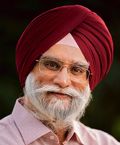‘A Rescue in Vienna’ by Vinay Gupta narrates the story of a Punjabi who saved Jews from Nazis
Punjabis are not known for documenting their history, even as they played an outsized role in shaping major historical events. As time went by, information about what they achieved was lost; but, diligent research by dedicated writers has brought to light what the folds of time enveloped.
Historians, naturally, shoulder the main load, but personal or family histories bring to light events that may have escaped broader studies. This book is one such account of a person from Ludhiana, who found himself in a unique position to make a difference in the lives of people he met in Vienna.
Kundanlal earned his MSc degree in 1915. He passed the Provincial Civil Service examination and received favourable postings. But eventually, he quit to become a businessman. In 1921, along with his father, he purchased an old business venture, the Amrit Match Factory in Kota, and revitalised it. Kundanlal prospered, but remained restless. In time, he passed on his factory to his brother and relocated to Ludhiana, where he would later play a major role in organising the Ludhiana session of All India States Peoples’ Conference, when Jawaharlal Nehru and other leaders came to his house.
After some setbacks in his ventures, Rai Sahib Kundanlal transitioned into machine tool manufacturing. On one of his trips to Europe, he travelled to Vienna for treatment. Always on the lookout for business opportunities, he sought meetings with various manufacturers. Soon, he became aware of the malevolent Nazi discrimination against the Jews. His humanitarian and entrepreneurial instincts coalesced; on his personal guarantee, he secured visas for six Jewish families, allowing them to escape Austria and head to Ludhiana.
The coastal regions of India have long been a refuge for the Jews, but Punjab became a refuge for Iranian Jews, who had escaped the massacre in Mashhad. They found shelter in Maharaja Ranjit Singh’s kingdom in 1839 and lived in Rawalpindi.
A century later, in October 1938, the first European Jew reached Ludhiana — Hans Losch, a textile design expert, who began working at Kundan Cloth Mills. An honoured guest, he stayed at his house, which was strictly vegetarian. Kundanlal seldom, if ever, made allowances for others’ personal preferences! No surprise that Losch lasted only three months, before moving to Bombay.
Other families came. Kundanlal established a furniture business that would benefit from their expertise. However, starting a new business was challenging, both financially and because the specialised machinery failed to arrive. Later arrivals were given private accommodations and dietary independence, but they still had to live in a small town, with minimal interaction outside of each other and the workers. Over time, financial and social factors contributed to them seeking greener pastures, especially since the contract specified 25 per cent of the profits, but these suddenly impoverished individuals required regular payments, much like salaries. Kundanlal, who had sunk much money into the ventures, was left in a lurch after their departure.
Oh! The twice damned. They fled Austria and came to India because Hitler discriminated against the Jews. In mid-1940, colonial India interned them because they were Austrians. And because Austria was now a part of Germany, they were considered Germans! As Europeans, they received better treatment, but eventually found themselves imprisoned at Purandhar near Poona. The shifting fortunes of these families makes for a fascinating read, including how Alfred Wachsler and Marcel Levy moved to Karachi. However, Partition forced them out once again when they found themselves in an Islamic country that grew increasingly intolerant. In time, all families that Kundanlal had brought to India left.
We follow the fortunes of Kundanlal, who became estranged from his son. He founded a school, Kundan Vidya Mandir, in 1941, and left much of his fortune to the trust that continues his mission to educate Punjabis, particularly girls. Kundanlal’s legacy is alive through the institutions he founded. Now the world knows his story, written by his grandson. It is an intriguing well-researched tale of a complicated story of a gifted workaholic who “lived a modest life, not tainted by cupidity”, and was a success at many of his endeavours, even as he faced major challenges in his family life.
Most of all, it is the chronicle of an enterprising and compassionate Punjabi, who saved six Jewish families from the clutches of the Nazis.
— The writer is a Chandigarh-based senior journalist









